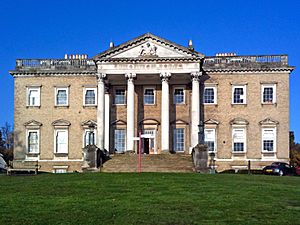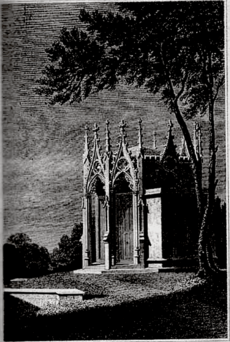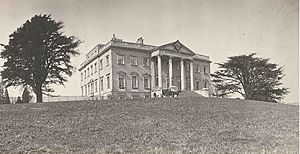Claremont (country house) facts for kids
Quick facts for kids Claremont House and Estate |
|
|---|---|

Façade of the Claremont House
|
|
| Type | Country House |
| Location | Esher, Elmbridge, Surrey |
| OS grid reference | TQ1333363470 |
| Built | 1774 |
| Architect | Lancelot "Capability" Brown Henry Holland |
| Architectural style(s) | Palladian |
| Owner |
|
|
Listed Building – Grade I
|
|
| Official name: Claremont House | |
| Designated | 14 August 1953 |
| Reference no. | 1030202 |
| Official name: Claremont | |
| Designated | 1 June 1984 |
| Reference no. | 1000324 |
| Lua error in Module:Location_map at line 420: attempt to index field 'wikibase' (a nil value). | |
Claremont is an old country house in Surrey, England. It's known for its beautiful design and large, historic gardens. Today, the main house is home to Claremont Fan Court School. The amazing gardens are looked after by the National Trust, a charity that protects historic places. Claremont House is a very important building, listed as Grade I.
Contents
Claremont's Early Days
The very first house at Claremont was built in 1708. It was designed by Sir John Vanbrugh, a famous architect and playwright. He also designed grand places like Blenheim Palace. Sir John built a "very small box" for himself, along with stables and walled gardens.
In 1714, a rich politician named Thomas Pelham-Holles bought the house. He was known as the Earl of Clare and later became a Prime Minister. The Earl asked Vanbrugh to make the house much bigger. He added two large wings and a special tower called a "belvedere" on a nearby hill.
The Belvedere Tower
From the belvedere, the Earl and his guests could enjoy amazing views of the Surrey countryside. They could even see Windsor Castle and St Paul's Cathedral on a clear day! The Earl named his new home "Clare-mount," which later became "Claremont."
The Famous Landscape Garden
The gardens at Claremont are some of the oldest and most important of their kind. They are an early example of the English Landscape Garden style. Many famous garden designers worked on them, including Sir John Vanbrugh, Charles Bridgeman, William Kent, and Capability Brown.
Work on the gardens started around 1715. By 1727, people were calling them "the noblest of any in Europe." One special part of the gardens is a grass-covered amphitheatre overlooking a lake. The Belvedere Tower, designed by Vanbrugh, is also in the grounds. It has a cool trick: what look like windows are actually bricks painted black and white!
In 1949, the Claremont landscape garden was given to the National Trust. They started a big project in 1975 to bring the garden back to its original 18th-century look. Today, the garden is also a Grade I listed site, meaning it's very important historically.
A New Mansion for Lord Clive
In 1769, the Claremont estate was bought by Robert Clive, 1st Baron Clive. He was a very rich and powerful figure who helped establish Britain's presence in India. Lord Clive decided to knock down the old house and build a brand new one.
He hired Capability Brown, a famous landscape designer, to build the current Palladian mansion. Brown also brought in Henry Holland as a partner, and even the famous architect Sir John Soane worked on the plans.
Lord Clive spent a huge amount of money, over £100,000, on the new house and gardens. Sadly, he never got to live in the house, as he passed away in 1774, the same year it was finished. After his death, Claremont was sold several times.
Clive's Coat of Arms
You can see a special carving on the front of the mansion. It shows Lord Clive's coat of arms mixed with his wife's family crest. Inside the house, there's a large map called "Claremont Palace" that shows the mansion and its grounds in detail. This map might be from the 1860s, when Queen Victoria often visited.
A Royal Home
In 1816, the British government bought Claremont as a wedding gift. It was for King George IV's daughter, Princess Charlotte, and her husband, Prince Leopold of Saxe-Coburg. The estate cost £60,000 at the time.
Sadly, Princess Charlotte, who was second in line to the throne, died at Claremont in 1817 after giving birth to a stillborn son. This was a great sorrow for the nation. Prince Leopold kept Claremont until he died in 1865, but he moved out in 1831 when he became the first King of the Belgians.
Queen Victoria's Visits
Queen Victoria loved Claremont. She visited often as a child and later as an adult, when her uncle Leopold lent her the house. She even lent it to the exiled French King and Queen, Louis-Philippe and Marie-Amelie, after they had to leave France in 1848. The former King died at Claremont in 1850.
In 1882, Queen Victoria bought Claremont for her youngest son, Prince Leopold, Duke of Albany, when he married Princess Helena of Waldeck and Pyrmont. They had two children, Alice and Charles. Charles was born at Claremont in 1884.
Claremont Changes Hands
Charles later became the Duke of Saxe-Coburg and Gotha in Germany. Because he served as a German general during the First World War, the British government decided he could not inherit Claremont. The estate was then sold to Sir William Corry, a shipping director. Later, it was bought by Eugen Spier, a German financier.
In 1930, Claremont was empty and almost going to be torn down. But then, a school from south London bought it, along with the Belvedere tower, stables, and some parkland. This school was later renamed Claremont School, and since 1978, it has been known as Claremont Fan Court School.
Claremont and the National Trust Today
The National Trust took over 50 acres of the Claremont estate in 1949. In 1975, with help from a special grant, they began restoring the beautiful 18th-century landscape garden. Today, visitors can see how different famous gardeners like Sir John Vanbrugh, Charles Bridgeman, William Kent, and Capability Brown shaped the gardens over time.
In 1996, the school celebrated the National Trust's 100th birthday. They opened up the 281-year-old Belvedere Tower to visitors for the first time, allowing everyone to enjoy this historic part of the grounds.
See also
- A307, Portsmouth Road
- Claremont Fan Court School
- Claremont Landscape Garden
- St. George's Church, Esher
 | Leon Lynch |
 | Milton P. Webster |
 | Ferdinand Smith |



